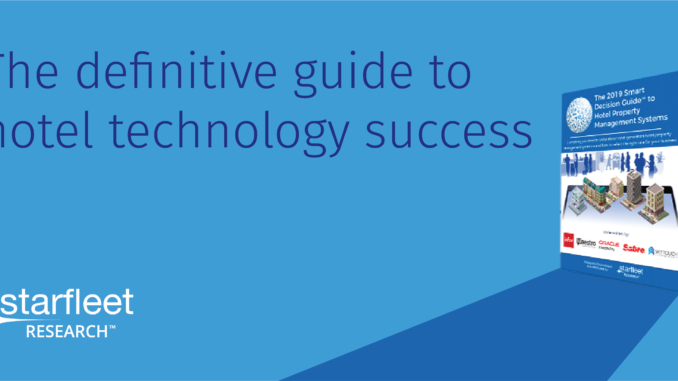
The 2019 Smart Decision Guide to Hotel Property Management Systems is hot of the press. Here are just a few key takeaways for hoteliers to keep in mind this year in their incessant quest to improve business operations, the guest experience, and financial performance.
Focus on guest experience management. A hotel needs to lavish its guests with personalized attention and pamper them with relevant services. This is particularly true of upscale properties that compete in large part on the quality of guest services. Today, hoteliers are becoming increasingly focused on data-driven personalization strategies. They are seeking ways to enhance the quality of the guest experience by understanding guests’ wants, needs, situations and preferences at a granular level and then acting upon that understanding to deliver superior, tailored services.
Focus on personalization. Closely related to guest experience management is the notion of personalization. The future success of many hotels and resorts, at least those operating in certain categories where service quality ranks as a key point of competitive differentiation, will rest squarely on how well they can gain a deep understanding of their guests on an individual basis. Importantly, success also rests on how well they can act upon that understanding to improve the overall quality of the guest experience. In fact, 89 percent of hoteliers “agree” or “strongly agree” that targeted personalization – i.e., presenting guests with highly relevant messages, offers and services at the right time – is one of the most effective ways to improve the guest experience and, ultimately, guest satisfaction, loyalty and favorable brand advocacy.
Focus on data integration and technology interoperability. For most hoteliers, data integration and technology interoperability are among the primary driving forces in their decision to upgrade to a next-generation hotel solution. In fact, according to the research, 91 percent of hoteliers “agree” or “strongly agree” that technology platform interoperability is a key success factor for hotel performance improvement. A fully-integrated PMS gives hoteliers a distinct and formidable advantage over competitors who may lack the same level of technology connectivity and data integration.
Focus on revenue management. A next-generation PMS captures and houses data related to everything from occupancy rates, ADR and booking pace to lengths of stay, booking channels and guest segments. This vast data repository provides the basis for identifying patterns and predicting future demand in guest room occupancy. PMS rate management features, including seasonal pricing, day-of-week pricing, time-of-day pricing, premium and discount rates and packages, and daily override functionality, enable hoteliers to respond immediately to both predicted and unpredicted fluctuations in guest demand. Advanced revenue management solutions are able to process increasingly large volumes of data, faster than ever before. Platform capabilities vary widely and come in a lot of different flavors in terms of how revenue management is handled.
Focus on mobile access. Mobility cannot be an afterthought when it comes to hospitality technology. A mobile-first design is imperative. All staff-facing interfaces need to allow for anywhere, anytime access. Providing staff members with real-time access to information via mobile devices can reduce guest wait times at the front desk during check-in, which is an important factor in overall guest satisfaction. Mobility can also mitigate other inconveniences that could impinge on the quality of the guest experience, including potential housekeeping and maintenance delays. For most hoteliers, being able to manage virtually all hotel operations from any place, at any time, via any device is a true game-changer.T

